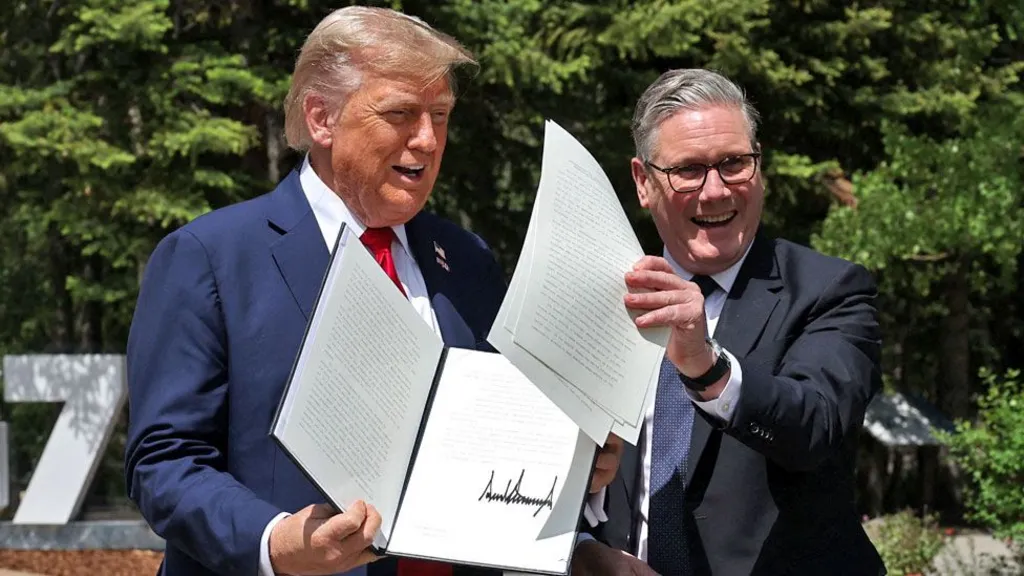In a significant move for transatlantic trade, former U.S. President Donald Trump has signed an executive order confirming key provisions of the UK-US tariff deal, reinforcing trade ties between the two long-time allies. The order cements components of the agreement aimed at reducing tariffs and stimulating economic cooperation in the post-Brexit era.
A Strategic Step in Post-Brexit Trade
The UK-US tariff deal was born out of necessity following the United Kingdom’s exit from the European Union. For decades, the UK’s trade agreements were governed by EU policy. Brexit, however, opened the door for Britain to pursue independent deals, and one of its top priorities was securing favorable trade terms with the United States.
The new order confirms U.S. commitments to ease or suspend certain tariffs on British goods, particularly in sectors such as steel, aluminum, and agriculture. In return, the UK is expected to eliminate or reduce duties on a range of American exports, including whiskey, motorcycles, and tech equipment.
Key Provisions of the Executive Order
The executive order signed by Trump outlines which aspects of the UK-US tariff deal will take immediate effect. Among the confirmed elements are:
- Tariff suspensions on British steel and aluminum imports, with volume limits to prevent market flooding.
- The elimination of retaliatory tariffs that the UK had imposed on U.S. goods, including bourbon and motorcycles.
- Regulatory cooperation provisions aimed at streamlining standards in the food and tech sectors.
- Support for ongoing negotiations to reach a broader free trade agreement in the future.
While Trump is no longer in office, his signature on the order formalizes the groundwork laid during his administration and reinforces continuity in U.S. trade strategy.
Impact on Industry and Economy
For U.S. manufacturers, the UK-US tariff deal promises expanded access to British markets. American steel and tech companies are expected to benefit most, as the UK shifts away from EU-imposed standards and toward bilateral terms with Washington.
British exporters, meanwhile, see the deal as a lifeline. Agriculture, particularly meat and dairy, will gain greater access to the American market — a key goal for UK farmers looking to diversify post-EU. British distilleries, which had suffered under punitive tariffs on spirits, are especially optimistic about the new terms.
Trade groups on both sides of the Atlantic have hailed the order as a step in the right direction. The U.S. Chamber of Commerce called it “a smart move for business and diplomacy,” while the UK’s Federation of Small Businesses noted it “sends a positive signal to the international marketplace.”
Political and Global Reaction
British Prime Minister Rishi Sunak welcomed the announcement, calling it “a firm foundation for a deeper trade partnership with the United States.” In Washington, both Republican and Democratic lawmakers voiced support, although some cautioned that broader trade negotiations must still prioritize labor and environmental standards.
European Union officials responded cautiously, noting that the UK-US tariff deal could further isolate the UK from EU trade norms. However, the World Trade Organization has not raised objections, suggesting the agreement remains within international trade rules.
What the Deal Means for the Future
Though not a full free trade agreement, the confirmed provisions of the UK-US tariff deal signal momentum. Analysts believe the two nations may revisit a comprehensive trade pact shortly, especially if political conditions on both sides become more favorable.
The order also sets a precedent for how the U.S. might approach trade with other post-Brexit partners, signaling flexibility and a willingness to act outside multilateral constraints when strategic interests align.
Conclusion
The confirmation of parts of the UK-US tariff deal via Trump’s executive order marks a notable milestone in modern trade diplomacy. While limited in scope, the order reflects a deepening of UK-US economic ties and lays the groundwork for more ambitious cooperation in the years to come. As businesses on both sides begin to feel the effects, the deal could become a template for future bilateral trade strategies in a rapidly evolving global economy.
Never Miss a Beat! Subscribe for the Latest News & Exclusive Updates!


